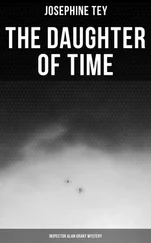About twenty minutes later I heard the successive closing of doors that meant that Yughourt was making his rounds. When I heard him in the compartment next door I began to wash, noisily. He tapped at the door a few moments later and asked if I were the passenger in B Seven. I said that I was. He announced that he had found my tickets and taken them. I heard him go through to the next coach and begin his door-slamming, and I walked back to B Seven and locked myself in.
After that I had three uninterrupted hours to make all perfect.
If you ever want to be sure of uninterrupted peace, my dear Mr Grant, buy yourself a sleeper ticket to the North of Scotland. There is nowhere in this world where one is so safe from interruption as one is in a sleeping compartment once the attendant has done his round. Not even in the desert.
I retrieved Kenrick from below the bunk, rubbed his head on the edge of the wash-hand basin, and laid him on the bunk. An examination of his clothes showed a gratifying cosmopolitanism. His underclothes seemed to be dhobi-washed, his suit made in Hong Kong, and his shoes in Karachi. His watch was a cheap metal one with neither name nor initials.
I removed the contents of his pockets and substituted Charles Martin’s pocket-book and its contents.
He was still alive, but he stopped breathing as we were running through the yards at Rugby.
From then on I dressed the set, as they say in the theatre. And I don’t think that I missed anything; did I, Mr Grant? The details were perfect, even to the crushed hairs in the wash-hand basin and the dusty palms of his hands. In the case that I was leaving behind were old clothes of my own, well-worn and washed, and of a type that he was in the habit of wearing; and such Frenchness as I had been able to supply from my own store: a novel and a Testament. The case also, of course, contained the all-important bottle.
Kenrick had an extraordinarily hard head. I refer to the matter of drink, of course, not to the results of sand-bagging. I had plied him with whisky at dinner, and had offered him a stirrup-cup of such dimensions that any other man would have blenched at the prospect. He did indeed look at the half-tumbler of neat whisky a little doubtfully, but, as I have said, he was always anxious to please me and he drank it down without protest. He remained sober; or to all appearances sober. But both his blood and his stomach would be whisky-sodden when he died.
So was his compartment when I had finished with it. As the lights of Crewe began to go by I put the final touch. I laid the half-full bottle on the floor and rolled it to and fro over the carpet. As the train slowed down I unlocked the door, shut it behind me, walked away down the train until I had several coaches between me and B Seven, stood looking in a casual, interested way at the traffic on the platform, stepped, still casual, down on to that platform and strolled along it. In hat and coat I did not look like a passenger and no one took any notice of me.
I came back to London on the midnight train, arriving at Euston at half-past three, and was so exhilarated that I walked all the way home. I walked as if on air. I let myself in, and was sleeping peacefully when Mahmoud came to call me at seven-thirty and to remind me that I had an appointment to entertain Pathé representatives at half-past nine.
It was not until you called to see me that I knew about the scribbled words on the newspaper that had been in his coat pocket. I admit that I was for a moment dismayed that I should have overlooked anything at all, but I was instantly comforted by the venial nature of the slip. It did not in any way detract from nor endanger my unique achievement. I had let him keep his deplorable rag, as a piece of set-dressing. That it proved to have Kenrick’s handwriting on it would not be of interest to authorities who had accepted the young man as Charles Martin.
The following evening, at the rush hour, I drove myself to Victoria and retrieved Kenrick’s two cases from the cloak-room. I took them home, removed from them all maker’s marks and easily identifiable articles, sewed them both up in canvas, and sent them with their contents to a refugee organisation in the Near East. If you ever want to get rid of anything, my dear Mr Grant, do not burn it. Post it to a remote island in the South Seas.
Having seen to it that the admirably reticent tongue of the Kenrick youth would stay reticent, I looked forward to enjoying the fruits of my labours. Indeed, yesterday I had assurance of sufficient backing for my new expedition, and had planned to fly out next week. The letter from Kinsey-Hewitt this morning alters all that, of course. The fruits of my achievement have been taken from me. But no one can take from me the achievement itself. If I cannot be known as the discoverer of Wabar, I shall be known as the author of the only perfect murder ever perpetrated.
I cannot stay to be a candle-holder at Kinsey-Hewitt’s triumph. And I am too old to have more triumphs of my own. But I can light a blaze that will make the candles on the Kinsey-Hewitt altar look small and pale and uninteresting. My funeral pyre will be a beacon to light all Europe, and my achievement in murder a tidal-wave that will sweep Kinsey-Hewitt and Wabar into the waste-paper baskets of the world’s Press.
This evening, at dusk, I light my own pyre, on the highest slope of the highest mountain in Europe. Mahmoud does not know this. He thinks we are flying out to Athens. But he has been with me for many years and would be very unhappy without me. So I am taking him with me.
Good-bye, my dear Mr Grant. It grieves me that someone of your intelligence should be wasting his talents in that rather stupid establishment on the Embankment. It was clever of you to discover that Charles Martin was not Charles Martin but someone called Kenrick, and I salute you. What you are not clever enough to discover is that he did not die by accident. What no one would ever be clever enough to discover is that I am the man who killed him.
Please take this letter as a mark of my esteem and pour prendre congé . Mrs Lucas will post this on Friday morning.
H. C. Heron Lloyd.
Grant became aware that Mrs Tinker was showing Tad Cullen into the room, and that she must already have been in without his noticing because the envelope from the Yard was lying beside him on the desk.
‘Well?’ said Tad, his face still thunderous. ‘Where do we go from here?’
Grant pushed over the pages of Lloyd’s letter for him to read.
‘What’s all this?’
‘Read it.’
Tad took the thing up doubtfully, looked for a signature, and then fell on the manuscript. Grant put his thumb in the envelope from Cartwright and broke it open.
When Tad had finished he looked up with a shocked face and stared at Grant. When at last he spoke what he said was: ‘I feel dirty all over.’
‘Yes. It is an evil thing.’
‘Vanity.’
‘Yes.’
‘That’s the crash that was in the evening papers last night. The crate in flames on Mont Blanc.’
‘Yes.’
‘So he would have got away with it after all.’
‘No.’
‘No? He had thought of everything, hadn’t he?’
‘They never think of everything.’
‘They?’
‘Murderers. Lloyd forgot so obvious a thing as finger-prints.’
‘You mean he didn’t do that job in gloves? I don’t believe it!’
‘Of course he did it in gloves. Nothing he touched in that compartment would have any print of his. What he forgot was that there was something in that compartment that he had handled before.’
‘What was that?’
‘Charles Martin’s papers.’ Grant flipped them with his finger-tip where they lay on the desk. ‘They are covered with Lloyd’s prints. They never think of everything.’
Читать дальше












